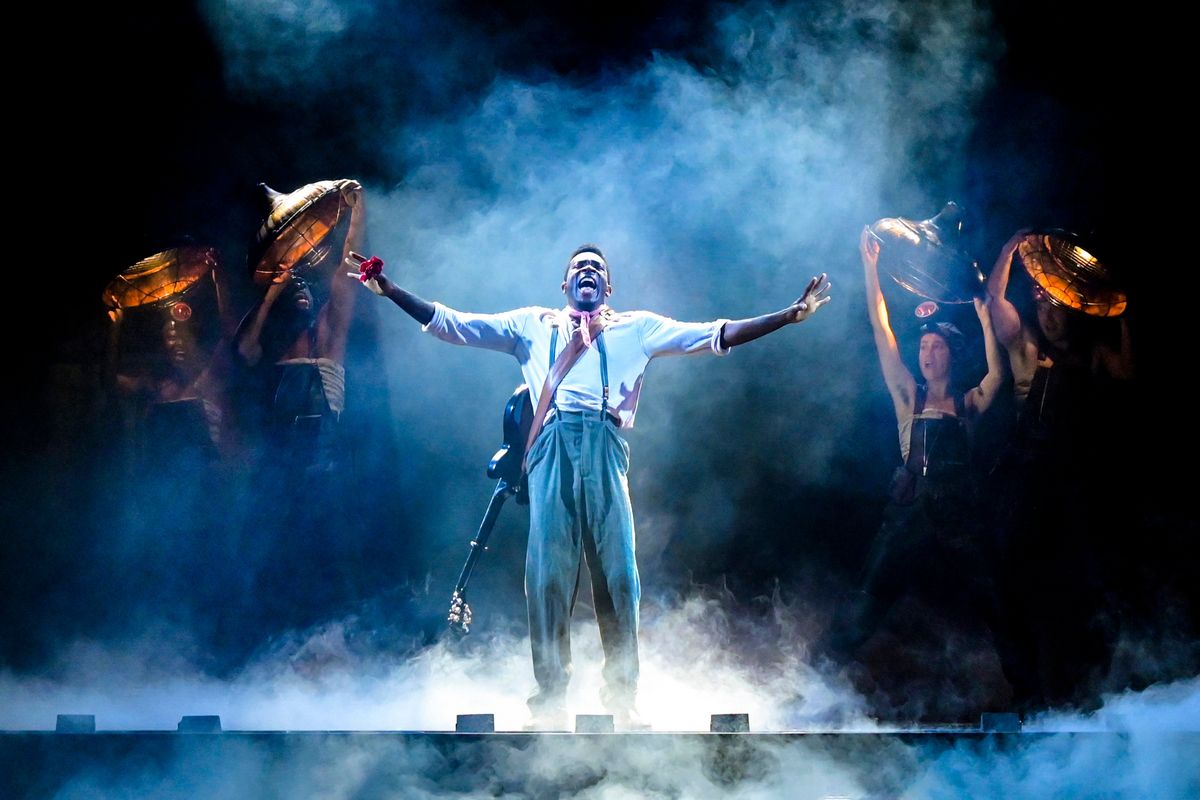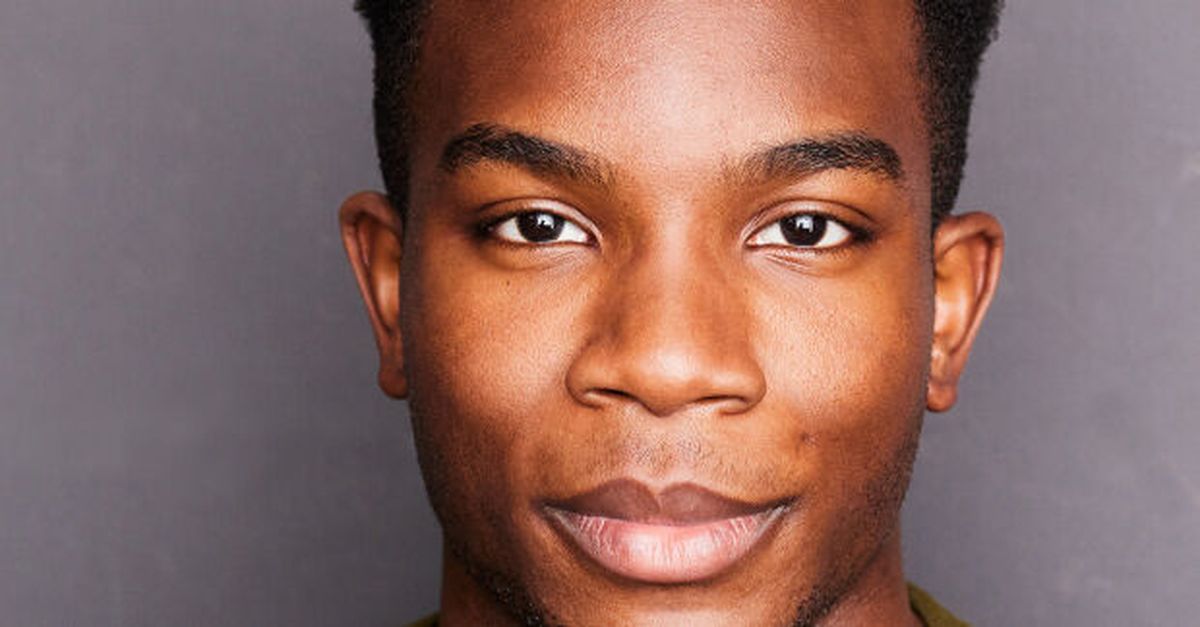‘On the road to ‘Hadestown,’ show’s new Orpheus finds his way to Spokane
Chibueze Ihuoma has assumed the role of Orpheus in the “Hadestown,” after being an understudy for the part since the musical’s tour began last year. (Courtesy)
“Hadestown” is a parable about late stage capitalism and climate change. It’s a saga about power and the powerless.
It’s a love story about two couples at different stages in their relationships.
Ultimately, it’s a tragedy as only the Greeks could create, set in 1930s America with music that blends folk, jazz and Americana.
Anais Mitchell’s folk opera that retells the myth of Orpheus and Eurydice opened on Broadway in 2019 after a circuitous road. From workshops and an off-Broadway run to out-of-town runs on stages in places like London and Edmonton, it arrived at Broadway’s Walter Kerr Theatre under the direction of Rachel Chavkin to much acclaim. It would go on to win eight Tony Awards, including best musical and best supporting actor for Broadway legend Andre De Shields. (Patrick Page, the Spokane-born actor who originated the role of Hades, earned his first Tony nomination for his performance.)
For Chibueze Ihuoma, Tuesday’s opening of “Hadestown” in Spokane as part of the STCU Best of Broadway series is a pretty big deal.
Ihuoma, who was raised in New Jersey, has been understudying the role of Orpheus since the tour began last year. When the tour’s Orpheus, Nicholas Barasch, announced he was leaving the show, Ihuoma was tapped to assume the role. He took over officially during the show’s current San Francisco run, and Tuesday will be the first time he plays the role for its entire run in a city.
It’s an experience in his career he’s been working toward, he said. He first heard of “Hadestown” as a theater student at New York University, when a friend turned him on to the off-Broadway recording.
“I’d been listening to the music and I was really drawn to Orpheus’ character,” Ihuoma said, as he found connection with Mitchell’s jazzy, folky Americana score. “I was at a part in my college career where they started encouraging us to listen and be prepared for future stuff. That’s half the battle, just knowing what things are brewing, so that by the time the audition call comes down or they start looking for new people for replacements, it’s not the first time you’ve heard of (the show).”
So as he started to look into the role of Orpheus, making sure he was technically ready to do the work the role requires, one thing became clear: “The first thing I needed was, ‘Oh, I need to learn how to play guitar.’
“So I worked on my guitar skills for that year, and was listening to that music and falling in love with it.”
See, Orpheus is a poet and a songwriter, the son of a muse who is determined to bring the world back into balance by writing a perfect song. Winters are getting longer because Hades, king of the underworld, and his wife, Persephone, have an unhappy marriage. She is supposed to spend six months each year in the upper world, bringing spring and summer with her. Her departure back to the underworld harkens the arrival of fall. But Hades keeps coming to retrieve her sooner, and keeping her with him for longer, making it tough for the folks in the upper world to grow enough crops and otherwise enjoy life.
Persephone is miserable. She’s a party girl who loves the sunshine and good times. Hades is miserable, too, and he throws himself into his work of building the underworld into an industrial power.
Meanwhile, Orpheus meets a girl, Eurydice, and they fall in love, but he is fixated on perfecting his song, ignoring her entreaties to help her gather enough food and fuel for the coming winter. Hades, entranced with the young woman, lures her to the underworld. Orpheus takes off to follow her, with the help of Hermes, the show’s narrator and the god in charge of escorting souls to the underworld.
For Ihuoma, the character is interesting to explore.
“He believes so much in the world, and he is someone who believes so strongly in the power of the music he can create to impact the world and change it,” he said, “and he has a strong philosophy of how the world should be, how he wants it to be, that he will do whatever it takes to make that happen.”
He auditioned for the tour to play Orpheus and made it to final callbacks. Producers told his agents they loved him, but that he was too green to lead the show, an assessment that Ihuoma completely agrees with. But he jumped at the chance to play a worker in the ensemble and understudy for Orpheus.
His time in the show, even as an ensemble member and understudy, has been so rewarding, he said. While he is an actor at the start of his career, he has been surrounded by veteran Broadway performers. Hermes is played by Levi Kreis, who won a Tony portraying Jerry Lee Lewis in “Million Dollar Quartet.” Kimberly Marable, who was in the original Broadway cast of “Hadestown,” plays Persephone. Hades is played by Kevin Morrow, whose off-Broadway credits are extensive, including “Moulin Rouge,” the revival of “The Color Purple,” “Bandstand,” as well as being in the closing company of “A Chorus Line.” Morgan Green comes to the role of Eurydice after being in the original Broadway cast of “Be More Chill.”
“There’s a certain level of professionalism, a certain level of attentiveness, a certain level of focus,” Ihuoma said. “I watch people like Kevin, Kimberly and Levi, they are masters of directing all their energy, like this fine laser and shooting it, at the person they are talking to. You’ll see someone like Kevin (and Kimberly) singing a song like ‘How Long,’ and technically they’re just singing across a circle, but the story they’re able to tell with the small gestures they give to each other, and when they decide to touch … it informs so much. I definitely have learned how to specify my acting from them.”
One thing about this show, he noted, is that audience members don’t have to be huge fans to enjoy it, or even knowledgeable about Greek mythology. The music itself is reason enough to check it out, he said.
“This show is a celebration of joy and a celebration of music,” he said. “This music is so eclectic, but also so soul-enriching. On top of that, it’s a celebration of love in all its forms. Love for a person, love for your community, love for the world as a whole.”


